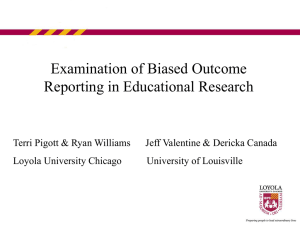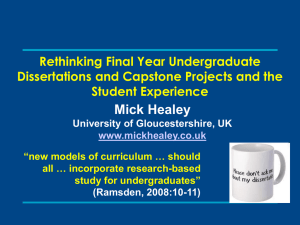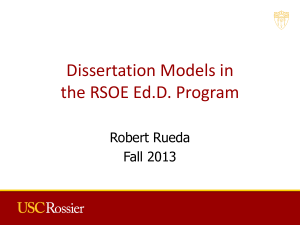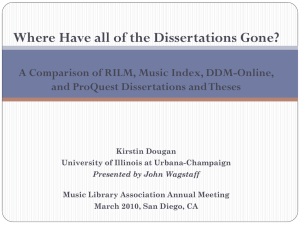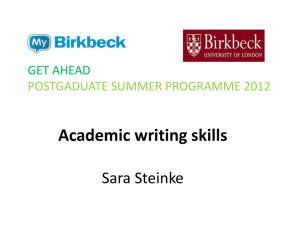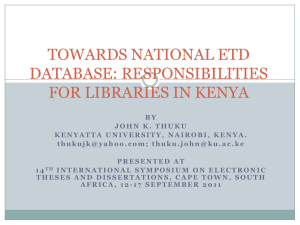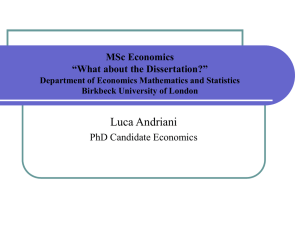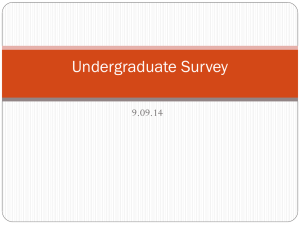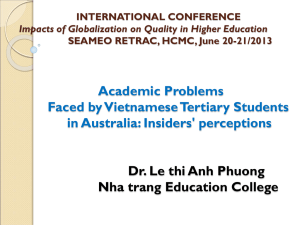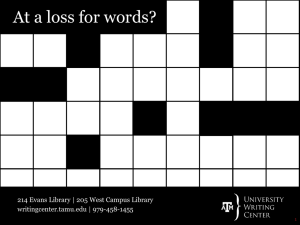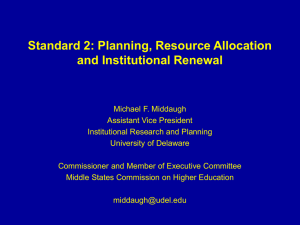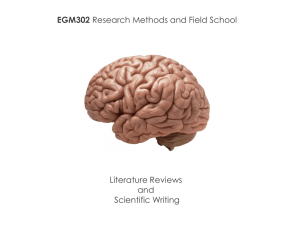Rethinking final year projects and dissertation
advertisement
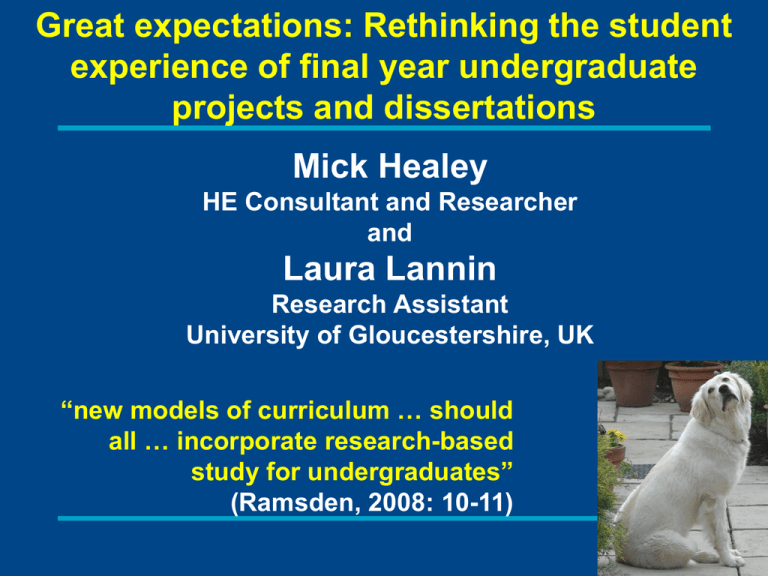
Great expectations: Rethinking the student experience of final year undergraduate projects and dissertations Mick Healey HE Consultant and Researcher and Laura Lannin Research Assistant University of Gloucestershire, UK “new models of curriculum … should all … incorporate research-based study for undergraduates” (Ramsden, 2008: 10-11) Brief biography: Mick • HE Consultant and Researcher and Emeritus Professor University of Gloucestershire, UK • Economic geographer and Director Centre for Active Learning • Director HE Academy projects on ‘Undergraduate research’ and ‘Rethinking final year projects and dissertation’ • Ex-VP for Europe International Society for Scholarship of Teaching and Learning • National Teaching Fellow and Senior Fellow HE Academy • Advisor to Canadian Federal Government ‘Roundtable on Research, Teaching and Learning in post-Secondary Education’ (2006) • Advisor to National Academy for Integration of Research, Teaching and Learning (Ireland) (2007-11) • Advisor to Australian Learning and Teaching Council Projects on the ‘Teaching-research nexus’ (2006-08), ‘Undergraduate research’ (2009-10), and ‘Teaching research’ (2011-13 ) • Advisor to League of European Research Universities on research-based teaching (2009) • Honorary Professor University of Queensland; Adjunct Professor Macquarie University; Visiting Professor Edinburgh Napier and University of Wales Newport; International Teaching Fellow University College Cork; HE Academy Associate • Research interests: scholarship of teaching; linking research and teaching; active learning; developing an inclusive curriculum for disabled students Brief biography: Laura • Research Assistant: Rethinking Final Year Projects and Dissertations: Creative Honours and Capstone Projects • Research Assistant: Community Flood Archive Enhancement through Storytelling • Postgraduate Researcher at the Centre for Active Learning, University of Gloucestershire CeTL • Qualified Teacher of History (key stages three, four and five) • Masters by Research, Staff and student conceptions of citizenship education: a case study of the University of Gloucestershire (2010) • Research interests: teaching and learning, active learning, citizenship education and society Rethinking the dissertation Our argument is that a more flexible approach is needed in the form, function and assessment of final year projects and dissertations to meet the needs of all students Rethinking the dissertation Work in progress NTFS funded two year project based at University of Gloucestershire Rethinking Final Year Projects and Dissertations: Creative Honours and Capstone Projects Our working definition “Projects, which are wider than the traditional honours dissertation, that students undertake towards the end of their undergraduate degree, usually in their final or senior year, in which they engage in a significant amount of independent research or inquiry.” Capstone – term commonly used in North America and Australasia to refer to integrative final year projects Final year projects and dissertations In US: The Boyer Commission (1998, 27) recommended that all undergraduate programmes should “Culminate with a capstone experience. The final semester should focus on a major project and utilize to the full the research and communication skills learned in the previous years.” Final year projects and dissertations In Australia: Holdsworth et al. (2009) reported on Developing Capstone Experiences. In Europe: The reshaping of the length of the undergraduate degree through the Bologna process has forced rethinking about whether, how and when to ensure a research emphasis. Final year projects and dissertations In Britain: The final year dissertation, which has traditionally been seen as the gold standard for higher education, is coming under pressure for reform as student participation rates have increased, the numbers studying professional disciplines have grown, and staff-student ratios have deteriorated. Final year projects and dissertations Our project is about rethinking the dissertation. We feel that we can learn much from the experience of running capstone courses. Our focus is on students undertaking research in their final year, but it is wider in its conception, function, form, location and how it is disseminated and assessed than the traditional dissertation. Contrast with traditional honours dissertation Wider in their: • conception (e.g. collaborative projects as part of a research group; consultancy projects); • function (e.g. synthesising capstone projects; preparatory projects for transition into a profession); • form (e.g. student group projects); • location (e.g. employer and community based projects); and/or • how they are disseminated and assessed (e.g. through exhibitions, undergraduate research conferences and other forms of public engagement) Final year projects and dissertations One minute each way In pairs you each have ONE minute to tell the other of an example or an experience you are familiar with of innovative ways of engaging students in final year projects and dissertations Final year projects and dissertations Alternative research-led projects in Biosciences at Durham a) Laboratory-based project b) Biology enterprise c) Biology into schools In Biosciences at Leeds they have 7 alternatives Final Year Undergraduate Dissertations and Capstone Projects MIT@Lawrence is a university-community partnership that connects faculty, students and staff at MIT with communitybased organizations and civic leaders in the City of Lawrence, Massachusetts. Final year projects and dissertations British Conference on Undergraduate Research UCLAN 2011 Warwick 2012 Plymouth 2013 Final year projects and dissertations Draw on wide range of literature • Linking research and teaching • Undergraduate research and inquiry • Employment and community based projects • Capstone projects and integrative learning • Independent, creative and transformational learning • Equity and widening participation issues • Graduate attributes and standards • Assessment of individual and group projects • Disseminating and celebrating undergraduate work Final year projects and dissertations Alternative or additional projects, some of which may be employment or community-based, are required to meet the needs of all students regardless of background, discipline or life goals. Final Year projects and dissertations Research question: ‘How can final year undergraduate projects and capstone projects be designed and assessed to help students prepare for an uncertain world?’ Final Year projects and dissertations Case studies • Arts, Design, Media and Humanities • Business, Hospitality, Law, Sport and Tourism • Interdisciplinary • Education, Social and Environmental Sciences • Science, Technology, Engineering and Mathematics Final year projects and dissertations In groups of 3-4s each of you should look at least one different mini-case study (pp 7- 41) and identify interesting practices which you then share with others in your group. Be ready to report back on ONE interesting idea from your group Time: 10 minutes Dimensions of final year projects and dissertations Additional to honours project Campus based Undertaken at the University Research preparation Student learning centred Discipline based Student initiated Individual Original to the student University audience In-depth analysis Assessed by academics Individual supervision Alternative to honours project Employer / community based Distance learning Professional / employment preparation Outcome product centred Multi- or interdisciplinary Teacher / supervisor initiated Group Original to the discipline Professional / public audience Synthesis of knowledge/skills Assessed by peers / professionals Group / peer supervisions Final year projects and dissertations We value highly the traditional dissertation as a potentially transformational experience, but we feel one size does not fit all. Argue need for greater choice in the form the dissertation may take, the nature of the end product, and the ways in which it is assessed. Additional or alternative experience? “I cannot think of anything more unfair than … to treat all students as if they are the same, when they so manifestly are not” (Elton 2000: 1). Learning outcomes for final year dissertations and projects Though we argue that there should be a variety in the conception, function, form, and location of final year projects and dissertations and how they are disseminated, all should deliver a similar set of learning outcomes. In small groups discuss whether you agree with the ten key characteristics of dissertations on pp 2-3 and whether there are any missing. Some additional shapes and forms for dissertations are shown on pp 3- 4. Student experiences of the dissertation We asked some broadcast journalism students what they thought about traditional dissertations and whether some 'rethinking' was needed. Student experiences of the dissertation http://insight.glos.ac.uk/tli/activities/ntf/creativehops/studentvoice/ Pages/UniversityofGloucestershire.aspx Final year projects and dissertations An invitation to participate and send us a case study (see pp 39-40) Source: UCLAN 2010 Final year projects and dissertations Let’s be creative and go beyond the traditional dissertation and capstone project
